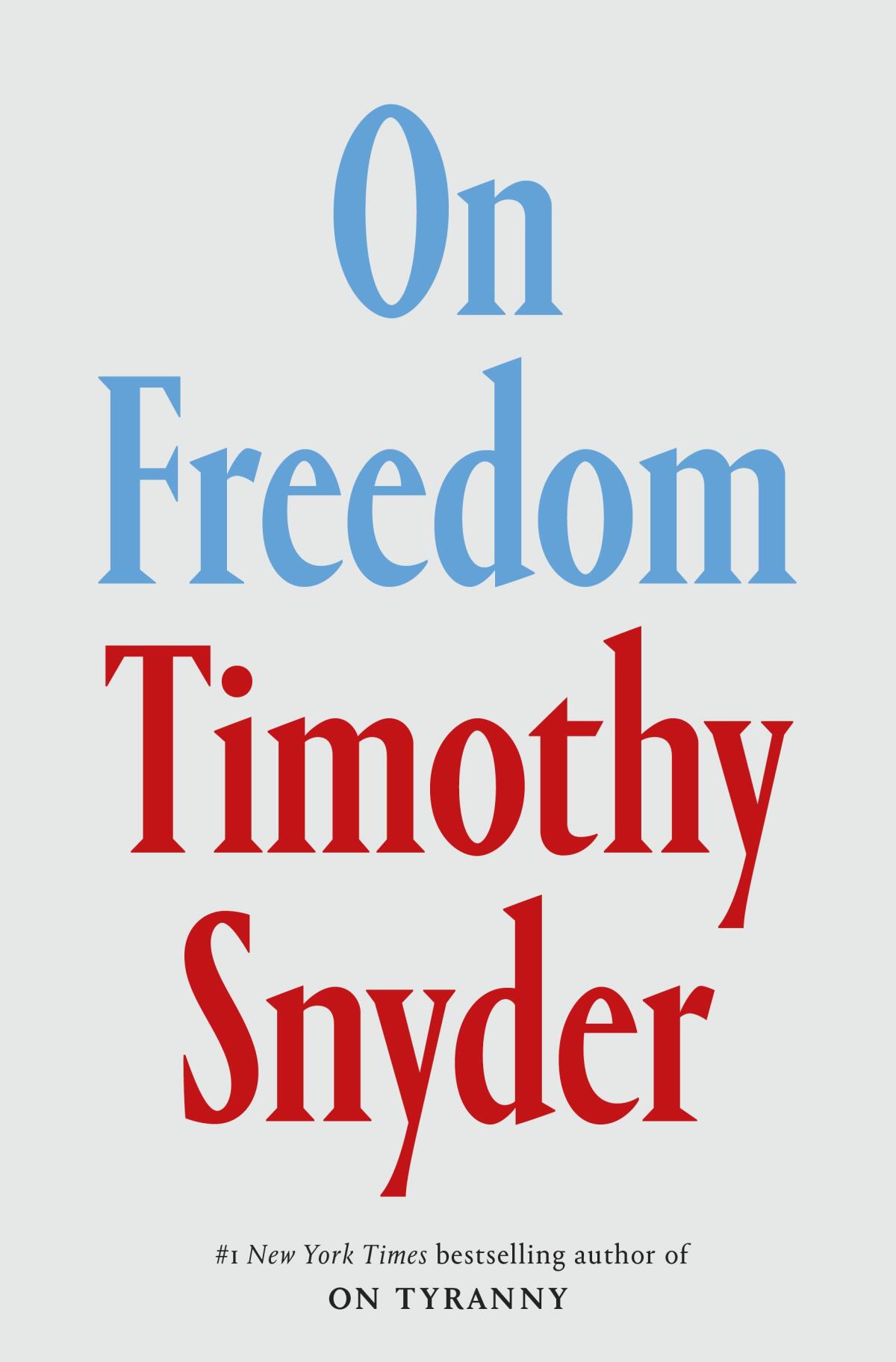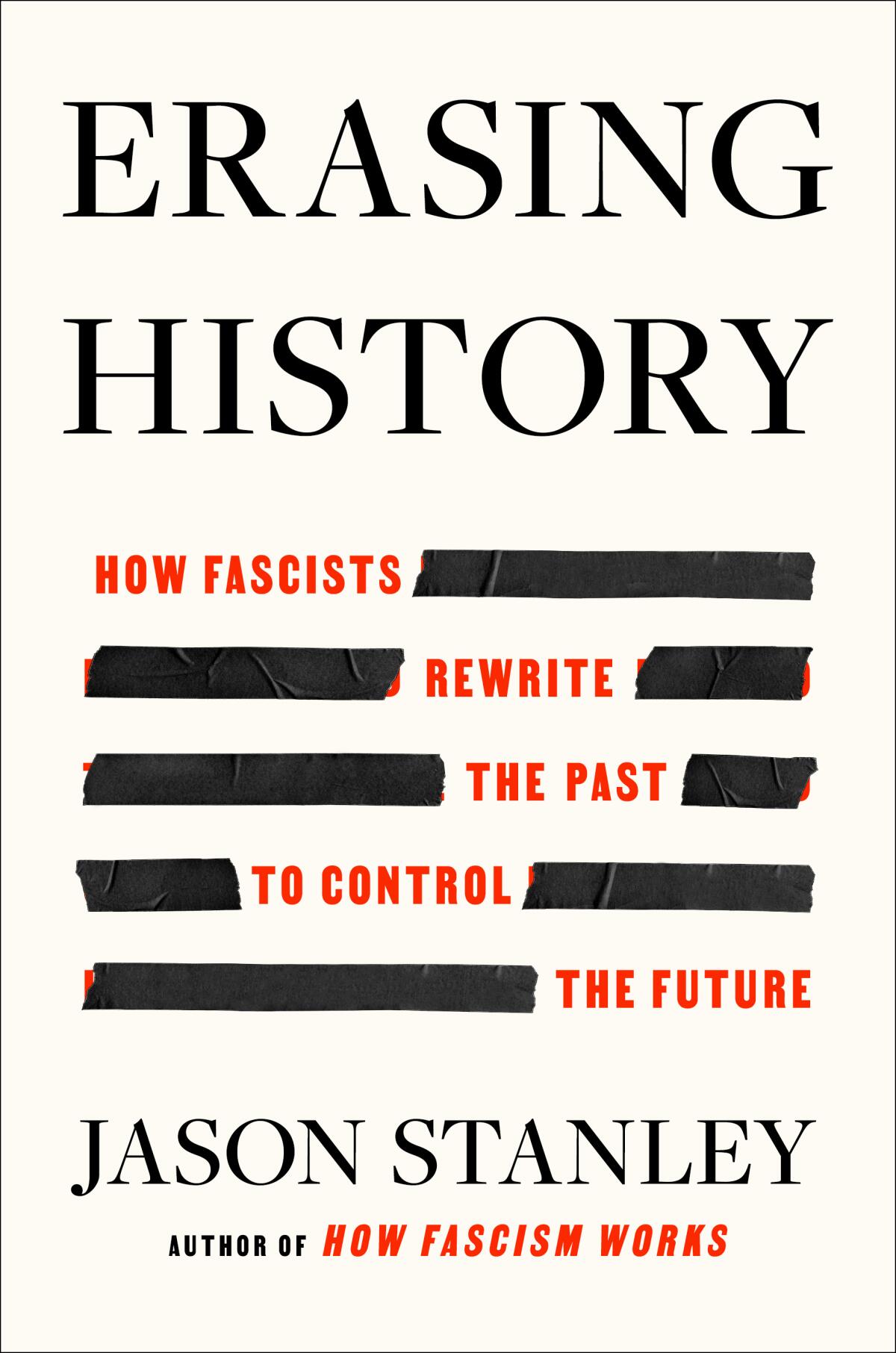How ‘freedom’ got twisted in the American mind, fueling fascism

- Share via
Book Review
On Freedom
By Timothy Snyder
Crown Publishing: 368 pages, $32
If you buy books linked on our site, The Times may earn a commission from Bookshop.org, whose fees support independent bookstores.
Book Review
Erasing History: How Fascists Rewrite the Past to Control the Future
By Jason Stanley
Atria/One Signal: 256 pages, $28.99
If you buy books linked on our site, The Times may earn a commission from Bookshop.org, whose fees support independent bookstores.
As fascism rose in Europe a century ago and escalated into the horrors perpetrated by Nazi Germany, Americans told themselves: “It can’t happen here.”
Think again.
In two September releases by noted Yale scholars, philosopher Jason Stanley and historian Timothy Snyder argue that America’s myth of its own exceptionalism makes the United States especially fertile ground in which fascist weeds proliferate. In “Erasing History,” Stanley shows that the recent attacks on public education culminate from fascist policies going back to the Reagan administration. “On Freedom” explores a path away from such trends, as Snyder sets out to define “positive” freedom — not just rejecting autocratic rule, but moving toward liberty.
Both Snyder and Stanley make strong cases that American notions of “freedom” ultimately choke individual liberty, and both see changes in the social contract under President Reagan as setting up this moment of growing attacks on education, civil rights and the free proliferation of ideas.

In part, they fault journalists. By covering book bans and curriculum restrictions as discrete problems driven by white, Christian populism, the news industry fails to connect the dots that these incidents are focused on a common aim of a government based on a merger of corporate and fascist ideas and have been bankrolled by tech billionaires and right-wing groups representing wealthy interests. That way lies fascism.
To understand how fascist ideals have been embraced in all levels of American society and government, it’s helpful to reacquaint ourselves with what fascism is: a system of authoritarian, ultranationalist government that promotes theories of “racial purity” and hypermasculinity, which naturalizes oppressive domestic policies.

In my own education on 20th century fascism, I found Umberto Eco’s 1995 essay on the topic to be a great distillation of its aim. In the tradition of that article, Stanley crafts a list of 21st century criteria by which to recognize fascism. It emphasizes how notions of racial superiority drive fascist ideology. Like Snyder, he’s less worried about semantics than about pointing to the authoritarian, even totalitarian regimes that have risen in Russia, Hungary, India, Turkey, Israel and Italy. It is a growing global threat. It can happen here.
Stanley focuses his attention on the ideological, politically driven battles occurring over education nationwide. He breaks down how their aims to create a single narrative of American history are part of a larger project to create a docile electorate that will follow a charismatic politician who promises to simplify a complex world. In looking at historical precedents and examples from nations where similar attacks on education have succeeded, he notes five characteristics of a fascist education: “national greatness; national purity; national innocence; strict gender roles; and the vilification of the left.”
The movement against gendered (and transgendered) multicultural interpretations of American history, including the targeting of the 1619 Project and a deliberate misinterpretation of critical race theory, seeks to create a fundamentalist Christian and extreme conservative portrayal of America as “an exemplary nation,” as the Trump White House once described it. The goal is not simply to ignore the histories of slavery and continuing Black oppression, the genocide of Indigenous peoples, the contributions made by nonwhite immigrants, and the very existence of gay and transgender people. The larger agenda is to create a narrative in which America’s greatness lies in a divine unity of purpose given to its white founders, which must be safeguarded by white people.
In his compelling and reader-friendly prose, Stanley connects Nazi methods — rewriting German history to exclude Jewish contributions and to assert a right to other nations’ lands — with modern American trends such as the efforts of Florida Gov. Ron DeSantis, including book bans, attempts to erase mentions of race or sexuality and gender in public schools, and the dismantling of Florida’s institutions of higher education. Similar policies have plagued other states.
As both scholars argue, these attacks on education soften the ground for totalitarianism by further dismantling notions of what constitutes a fact, along with the assertion that the only truth is an official truth. When traditional sources of knowledge such as news media, public education and scientific expertise are discounted, fascists can create their own reality and get away with a lot. We have already seen this in the U.S.: Russian disinformation campaigns fueled sham “debates” about the Kremlin’s sovereign right to annex Ukraine, and so what is a simple fact — Russia does not have the right to invade its neighbors — became a point of debate, weakening international support for Ukraine.
As Snyder writes about these and similar efforts, we are offered a “reassuring story”: “Politics can be safely located in legend. Time loops back to a mythical moment when the tribe was great. What was lost since then is the fault of some other group.”
Snyder’s work on German and Soviet history led him to write earlier books about how regimes in those nations eroded freedom. His deep political and philosophical examination of how to do the opposite, how to create and sustain freedom, provides a hopeful view for the future. The work may daunt some readers, but like Stanley, Snyder renders political theories and complex philosophical debates about epistemology and ethics into friendly language that engages and educates.
One example from Snyder is a radically fresh understanding of the founders’ worldview. Rather than embracing the “freedom to,” our understanding of the Constitution and political culture is built on notions of “freedom from.” As a result, American conservatism has built itself on notions of economic restraint as guaranteeing the rights of the individual, as though people have liberty if they are free from taxation, free from government regulation and free from the needs of others. After 9/11, many Americans were persuaded that it was right to give up civil liberties for “security.” Snyder observes that such negative notions of freedom also convey that the U.S. government and other Americans are a constant threat.
Snyder argues that positive freedom is necessary for creation of the whole self. The freedom to become a mature individual necessitates access to nutrition, healthcare, education and financial resources. No individual is free when basic survival is a struggle.
Snyder zeros in on a chapter in American history when a negative understanding of freedom was taken to an extreme: the Reagan years, when “me, me, me” thinking prevailed. White members of the baby boom, who directly benefited from government programs that nurtured and protected them, promptly pulled up the ladder when they voted for Reagan’s plans to dismantle the federal government. The 2020s’ vast economic disparities are its result.
Negative views of freedom foster a zero-sum mindset, as though each of us must strive to be free from the burden of being part of a society. This fuels racism, xenophobia and misogyny as tools to keep others from getting a piece of the pie. A population so resentful of others’ progress is an easy target for leaders who promise a strict government regime to curb others’ access to education, health and safety. Even now, mass incarceration mimics an apartheid state, depriving millions of civil rights such as voting, largely along racial lines.
Snyder takes readers through historical and contemporary examples to demonstrate how we can make progress, and are much better served, by embracing positive freedoms. A positive freedom that guarantees everyone access to affordable healthcare would give many in the middle class the liberty to pursue career opportunities without losing health benefits. The development of children’s minds in well-funded schools ensures creative and thoughtful individuals who invent new solutions that will benefit our nation’s future.
What we see in the United States today — attacks on the governmental institutions that provide support to all and the emergence of an educational system devoted to maintaining white supremacism — robs the American people of the critical skills they need to recognize authoritarian rhetoric and to see the promise of democracy and equality.
Lorraine Berry is a writer and critic living in Oregon.
More to Read
A cure for the common opinion
Get thought-provoking perspectives with our weekly newsletter.
You may occasionally receive promotional content from the Los Angeles Times.






